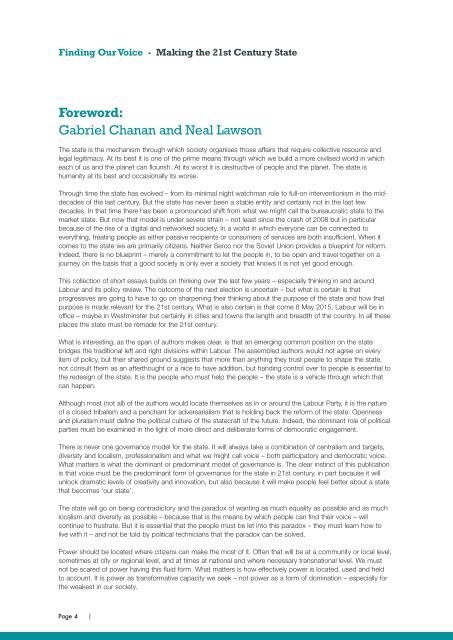Compass-Finding-Our-Voice-Final1
Compass-Finding-Our-Voice-Final1
Compass-Finding-Our-Voice-Final1
Create successful ePaper yourself
Turn your PDF publications into a flip-book with our unique Google optimized e-Paper software.
<strong>Finding</strong> <strong>Our</strong> <strong>Voice</strong> - Making the 21st Century State<br />
Foreword:<br />
Gabriel Chanan and Neal Lawson<br />
The state is the mechanism through which society organises those affairs that require collective resource and<br />
legal legitimacy. At its best it is one of the prime means through which we build a more civilised world in which<br />
each of us and the planet can flourish. At its worst it is destructive of people and the planet. The state is<br />
humanity at its best and occasionally its worse.<br />
Through time the state has evolved – from its minimal night watchman role to full-on interventionism in the middecades<br />
of the last century. But the state has never been a stable entity and certainly not in the last few<br />
decades. In that time there has been a pronounced shift from what we might call the bureaucratic state to the<br />
market state. But now that model is under severe strain – not least since the crash of 2008 but in particular<br />
because of the rise of a digital and networked society. In a world in which everyone can be connected to<br />
everything, treating people as either passive recipients or consumers of services are both insufficient. When it<br />
comes to the state we are primarily citizens. Neither Serco nor the Soviet Union provides a blueprint for reform.<br />
Indeed, there is no blueprint – merely a commitment to let the people in, to be open and travel together on a<br />
journey on the basis that a good society is only ever a society that knows it is not yet good enough.<br />
This collection of short essays builds on thinking over the last few years – especially thinking in and around<br />
Labour and its policy review. The outcome of the next election is uncertain – but what is certain is that<br />
progressives are going to have to go on sharpening their thinking about the purpose of the state and how that<br />
purpose is made relevant for the 21st century. What is also certain is that come 8 May 2015, Labour will be in<br />
office – maybe in Westminster but certainly in cities and towns the length and breadth of the country. In all these<br />
places the state must be remade for the 21st century.<br />
What is interesting, as the span of authors makes clear, is that an emerging common position on the state<br />
bridges the traditional left and right divisions within Labour. The assembled authors would not agree on every<br />
item of policy, but their shared ground suggests that more than anything they trust people to shape the state,<br />
not consult them as an afterthought or a nice to have addition, but handing control over to people is essential to<br />
the redesign of the state. It is the people who must help the people – the state is a vehicle through which that<br />
can happen.<br />
Although most (not all) of the authors would locate themselves as in or around the Labour Party, it is the nature<br />
of a closed tribalism and a penchant for adversarialism that is holding back the reform of the state. Openness<br />
and pluralism must define the political culture of the statecraft of the future. Indeed, the dominant role of political<br />
parties must be examined in the light of more direct and deliberate forms of democratic engagement.<br />
There is never one governance model for the state. It will always take a combination of centralism and targets,<br />
diversity and localism, professionalism and what we might call voice – both participatory and democratic voice.<br />
What matters is what the dominant or predominant model of governance is. The clear instinct of this publication<br />
is that voice must be the predominant form of governance for the state in 21st century, in part because it will<br />
unlock dramatic levels of creativity and innovation, but also because it will make people feel better about a state<br />
that becomes ‘our state’.<br />
The state will go on being contradictory and the paradox of wanting as much equality as possible and as much<br />
localism and diversity as possible – because that is the means by which people can find their voice – will<br />
continue to frustrate. But it is essential that the people must be let into this paradox – they must learn how to<br />
live with it – and not be told by political technicians that the paradox can be solved.<br />
Power should be located where citizens can make the most of it. Often that will be at a community or local level,<br />
sometimes at city or regional level, and at times at national and where necessary transnational level. We must<br />
not be scared of power having this fluid form. What matters is how effectively power is located, used and held<br />
to account. It is power as transformative capacity we seek – not power as a form of domination – especially for<br />
the weakest in our society.<br />
Page 4 |


